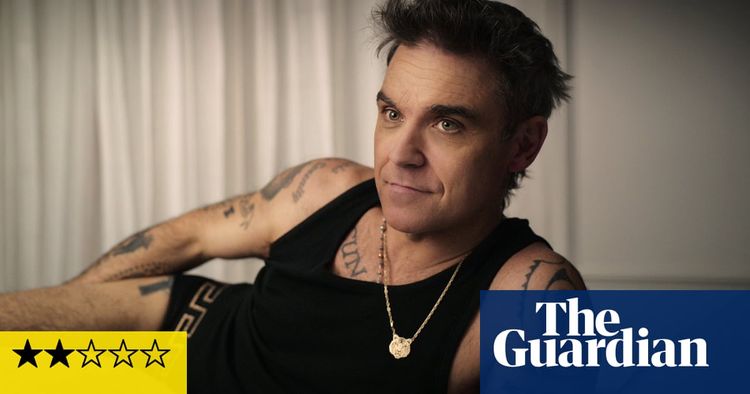Robbie Williams review – four hours of grim navel-gazing from the uber-star in his undies

Robbie Williams is currently sitting on his bed in his Los Angeles mansion without wearing any pants. He is watching old footage of himself on a laptop, which shows a range of behind-the-scenes clips that go back to the Take That days, through to his solo career, and even his difficult exit from the center of the music industry. It's unclear why he is not wearing pants while watching this footage. Perhaps it is meant to symbolize the personal and uncensored nature of his documentary series or maybe it's simply due to Robbie's natural tendency to show off (as if we needed yet more evidence of that).
Regardless of the cause, the underwear on display in the footage adds to the overall self-indulgent feel. The majority of the footage features Williams himself, with only his occasional collaborator Guy Chambers as the other main character. Williams' wife, Ayda Field, appears briefly, but there are no other interviews included. The result is a seemingly insular, introspective, four-hour-long dialogue in which Robbie discusses the depressive tendencies, anxiety, and addiction that he has dealt with throughout his life as a highly celebrated musician.
Maybe not his whole existence. The film, helmed by Joe Pearlman (known for Lewis Capaldi's How I'm feeling Now), kicks off with Take That - dubbed by Cilla Black as "The most well-liked British group since the Beatles!" as evidenced by enjoyable vintage TV snippets - and doesn't delve into details about Williams' upbringing. As for his love life before Ayda, it's also clouded in uncertainty: there are plentiful clips of a 2000 trip with Geri Halliwell, yet it remains unclear if they were truly a couple.
Instead, the blog takes us on a raw journey through Williams' tumultuous career. He departs from Take That in anger towards Gary Barlow and spirals into a year-long addiction where he frequently indulges in cocaine at Groucho. Although his solo career with Chambers struggles initially, it eventually skyrockets to superstardom. However, Williams battles with paralyzing anxiety, leading him to halt performances and relapse severely. He ultimately finds love with Ayda, overcomes addiction, reconnects with Take That, becomes a parent, and resumes a thriving career as an incredibly successful artist.
Robbie Williams and David Beckham are often compared to each other due to their similar upbringings and rise to fame at a young age. Both were working-class boys from England who faced difficulties in school before becoming overnight sensations and eventually reaching immense levels of fame. Unfortunately, their fame also attracted negative attention from the tabloid media, which exploited their personal lives without any repercussions. During their peak popularity in the late 90s, Williams and Beckham were icons of British culture and continue to be seen as symbols of millennial nostalgia.
The differences between Beckham and Williams are very noticeable. Beckham is extremely quiet, while Williams talks a lot and is very funny. People wonder if he missed his true calling as a comedian. Beckham loves his sport, but Williams doesn't seem to enjoy his music as much. The documentaries about them are also very different. Beckham's documentary is a fun trip down memory lane with lots of famous people and funny videos. Williams' documentary is the opposite - it focuses on his struggles and ignores his successes (but this writer still loves Rock DJ).
This could be because the tone of the show clashes with the celebratory atmosphere. Williams seems to be struggling, as his public anxiety attacks are quite distressing to witness. He isn't satisfied with his own material, preferring indie cool over mainstream success ("I want to write a song like Karma Police but end up writing Karma Chameleon"). His unhappiness often manifests itself as anger, moodiness, and a tendency to direct his sharp wit towards his colleagues - and even the media (when asked what he would be if he wasn't a musician, Williams replied with a straight face, "a pig farmer").
The blog post states that there was no way out for Williams after the shock of Take That's success caused him distress. According to the post, his only solution was to seek even more fame and attention, as he confided in his 10-year-old daughter as a way to get back at Barlow. This quest for fame seems to continue with the existence of this series. Williams also attributes the intense pressure of being a solo performer to his second breakdown. However, he has difficulty sharing the spotlight, first with Barlow and then with Chambers, whom he parted ways with in 2002.
The blog post is quite depressing, but the mood changes when discussing Williams' single "Rudebox" from 2006. The media was not very kind to it, and Williams appears to still be affected by the negative reviews. However, he takes the song very seriously despite its silly lyrics and it's almost comical to see the reaction. It's difficult to decide whether to find it amusing or sad.
It's unlikely that you'll experience either scenario. The negative mental effects of fame are no laughing matter, and Robbie Williams serves as proof that being a celebrity is both a burden and a compulsion. Consequently, watching his series feels like voyeurism of a calamity. Additionally, empathizing with Williams is challenging as the documentary only portrays a narrow view of his life, which harms the show.











































































